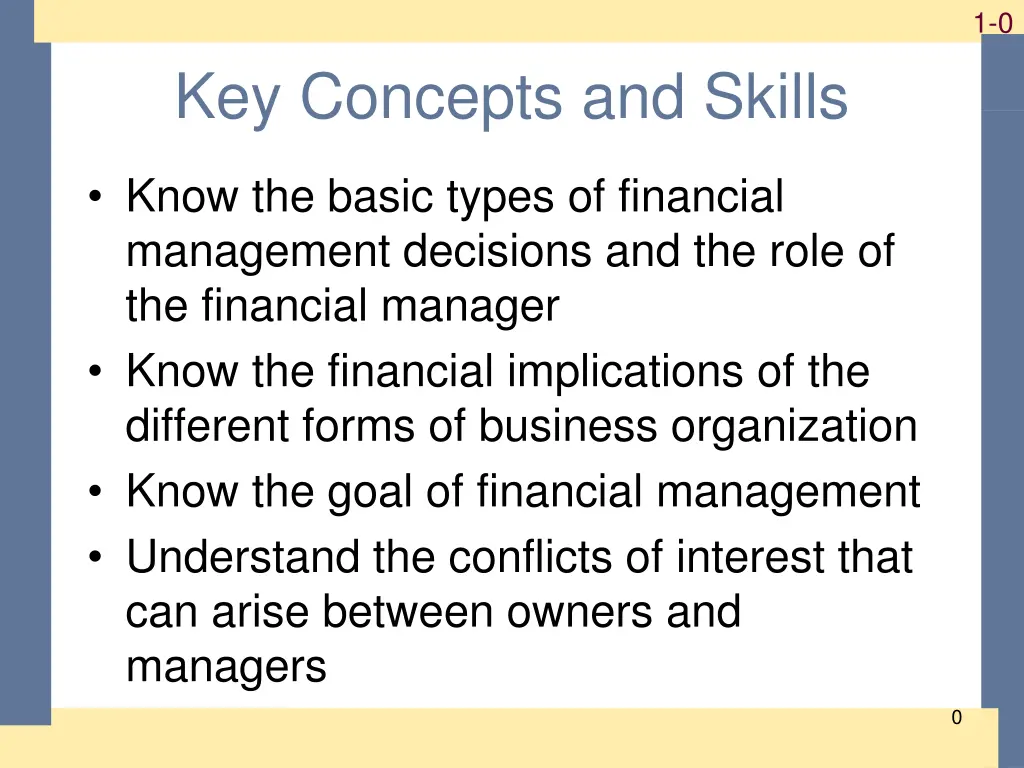
Understanding Financial Management Decisions and Goals
Explore key concepts in financial management, including types of decisions, business organization forms, the role of financial managers, and conflicts of interest. Delve into the goal of financial management and learn about the agency problem in corporations. Gain insights into financial markets, investments, international finance, and the functions of financial institutions. Discover opportunities in the field of finance and why studying finance is essential for various aspects of personal and professional life.
Download Presentation

Please find below an Image/Link to download the presentation.
The content on the website is provided AS IS for your information and personal use only. It may not be sold, licensed, or shared on other websites without obtaining consent from the author. If you encounter any issues during the download, it is possible that the publisher has removed the file from their server.
You are allowed to download the files provided on this website for personal or commercial use, subject to the condition that they are used lawfully. All files are the property of their respective owners.
The content on the website is provided AS IS for your information and personal use only. It may not be sold, licensed, or shared on other websites without obtaining consent from the author.
E N D
Presentation Transcript
1-01-0 Key Concepts and Skills Know the basic types of financial management decisions and the role of the financial manager Know the financial implications of the different forms of business organization Know the goal of financial management Understand the conflicts of interest that can arise between owners and managers 0
1-11-1 bd09310_ Chapter Outline Finance: A Quick Look Business Finance and The Financial Manager Forms of Business Organization The Goal of Financial Management The Agency Problem and Control of the Corporation Financial Markets and the Corporation 1
1-21-2 Basic Areas Of Finance Corporate finance Investments Financial institutions International finance 2
1-31-3 Investments Work with financial assets such as stocks and bonds Value of financial assets, risk versus return, and asset allocation Job opportunities Stockbroker or financial advisor Portfolio manager Security analyst bd09310_ 3
1-41-4 Financial Institutions Companies that specialize in financial matters Banks commercial and investment, credit unions, savings and loans Insurance companies Brokerage firms Job opportunities bd09310_ 4
1-51-5 International Finance This is an area of specialization within each of the areas discussed so far It may allow you to work in other countries or at least travel on a regular basis Need to be familiar with exchange rates and political risk Need to understand the customs of other countries; speaking a foreign language fluently is also helpful 5
1-61-6 Why Study Finance? Marketing Budgets, marketing research, marketing financial products Accounting Dual accounting and finance function, preparation of financial statements Management Strategic thinking, job performance, profitability Personal finance Budgeting, retirement planning, college planning, day-to-day cash flow issues 6
1-71-7 Business Finance Some important questions that are answered using finance What long-term investments should the firm take on? Where will we get the long-term financing to pay for the investments? How will we manage the everyday financial activities of the firm? 7
1-81-8 Financial Manager Financial managers try to answer some, or all, of these questions The top financial manager within a firm is usually the Chief Financial Officer (CFO) Treasurer oversees cash management, credit management, capital expenditures, and financial planning Controller oversees taxes, cost accounting, financial accounting, and data processing 8
1-91-9 Financial Management Decisions Capital budgeting What long-term investments or projects should the business take on? Capital structure How should we pay for our assets? Should we use debt or equity? Working capital management How do we manage the day-to-day finances of the firm? 9
1-10 1-10 Forms of Business Organization Three major forms in the United States Sole proprietorship Partnership General Limited Corporation S-Corp Limited liability company bd09310_ 10
1-11 1-11 bd09310_ Sole Proprietorship Advantages Easiest to start Least regulated Single owner keeps all of the profits Taxed once as personal income Disadvantages Limited to life of owner Equity capital limited to owner s personal wealth Unlimited liability Difficult to sell ownership interest 11
1-12 1-12 Partnership bd09310_ Advantages Two or more owners More capital available Relatively easy to start Income taxed once as personal income Disadvantages Unlimited liability General partnership Limited partnership Partnership dissolves when one partner dies or wishes to sell Difficult to transfer ownership 12
1-13 1-13 bd09310_ Corporation Advantages Limited liability Unlimited life Separation of ownership and management Transfer of ownership is easy Easier to raise capital Disadvantages Separation of ownership and management (agency problem) Double taxation (income taxed at the corporate rate and then dividends taxed at personal rate, while dividends paid are not tax deductible) 13
1-14 1-14 Goal Of Financial Management What should be the goal of a corporation? Maximize profit? Minimize costs? Maximize market share? Maximize the current value of the company s stock? Does this mean we should do anything and everything to maximize owner wealth? Sarbanes-Oxley Act 14
1-15 1-15 The Agency Problem Agency relationship Principal hires an agent to represent its interests Stockholders (principals) hire managers (agents) to run the company Agency problem Conflict of interest between principal and agent Management goals and agency costs 15
1-16 1-16 Managing Managers Managerial compensation Incentives can be used to align management and stockholder interests The incentives need to be structured carefully to make sure that they achieve their goal Corporate control The threat of a takeover may result in better management Other stakeholders 16
1-17 1-17 Example: Work the Web The Internet provides a wealth of information about individual companies One excellent site is finance.yahoo.com Click on the Web surfer to go to the site, choose a company and see what information you can find! Web surfer 17
1-18 1-18 Figure 1.2 18
1-19 1-19 Financial Markets Cash flows to the firm Primary vs. secondary markets Dealer vs. auction markets Listed vs. over-the-counter securities NYSE NASDAQ 19
1-20 1-20 Quick Quiz What are the four basic areas of finance? What are the three types of financial management decisions, and what questions are they designed to answer? What are the three major forms of business organization? What is the goal of financial management? What are agency problems, and why do they exist within a corporation? 20






















